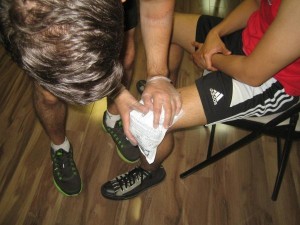Articular cartilage injury involves damage to the sturdy cartilage lining the ends of the bones. The articular cartilage is a smooth, hard material lining the ends of the bones. It is comprised of collagen which is also responsible for allowing smooth movement between the bone surfaces. Additionally, the cartilage is also extravascular in which it has no direct blood supply. It simply means that once it is damaged, it heals in a very slow rate.
What are the causes?
Articular cartilage injury can occur as an isolated event or along with other knee injuries. The injuries to the anterior cruciate ligament are typically linked with damage to the medial, inner and lateral surfaces of the tibia and femur.
Other injuries that can cause articular cartilage injury include strong impact on the joint such as tackles in rugby or football. These are usually linked with injuries to other structures inside the joint such as ACL and PCL ears and patellar dislocations.

Articular cartilage injury can lead to pain and inflammation in the knee joint. This is known to accelerate the development of osteoarthritis. In severe cases, damage to the articular cartilage can also lead to fractures in the bone beneath it.
What are the indications?
- Recurrent pain and swelling in the joint
- Locking of the knee due to the loose fragments inside the joint
- Perceivable clicking noises when the joint is moved
Management
The RICE method (rest, ice, compression, elevation) is used to reduce the swelling. An ice pack should be applied for 10-15 minutes every hour during the acute phase. As the swelling subsides, the frequency of the applications can be reduced.
NSAIDs such as ibuprofen might be prescribed by the doctor to reduce the swelling and pain. A sports injury professional can properly diagnose the injury as well as the extent of damage that requires an X-ray or arthroscopy.
For injuries that are not severe, conservative measures involves rest for several weeks followed by a rehabilitation program. For severe cases, especially those that involve a fracture or osteochondritis dissecans, surgery is required to fix the detached fragments.
Quick Note / Disclaimer
The material posted on this page on articular cartilage injury is for learning and educational purposes only. To learn to recognize and manage knee injuries, register for a first aid and CPR course with Saskatoon First Aid.
